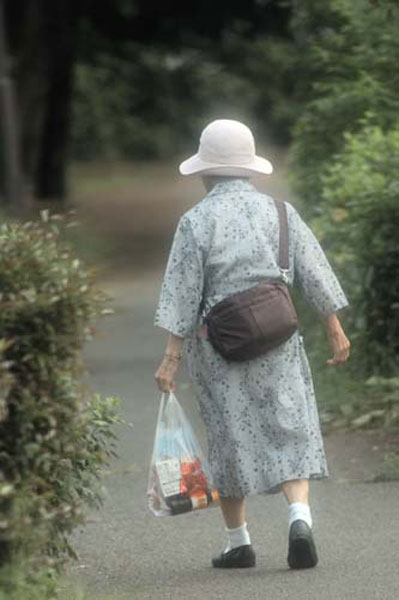HOME SAFETY FOR PEOPLE WITH ALZHEIMER’S DISEASE
Is it safe to leave the person with Alzheimer’s disease alone?
It will be necessary to evaluate this issue often throughout the course of the disease.
Does the person with Alzheimer’s disease…
Make sure that all areas which are accessible to the person with Alzheimer’s disease are safe and dangerous areas are difficult to access:
Kitchen:
Is it safe to leave the person with Alzheimer’s disease alone?

It will be necessary to evaluate this issue often throughout the course of the disease.
Does the person with Alzheimer’s disease…
- Display confused and unpredictable behavior under stress?
- Recognize dangerous situations such as fire?
- Know how to use a telephone when necessary? Knows their address and phone number?
- Know how to get help? Can they dial 911? Use a personal emergency response system?
- Become restless or show signs of agitation or depression if left in the home alone?
- Wander and become disoriented throughout the day or in the evening?
- Attempt to do activities that may need supervision such as cooking, repair, woodwork?
Make sure that all areas which are accessible to the person with Alzheimer’s disease are safe and dangerous areas are difficult to access:
Kitchen:
- Lock up cleaning supplies with childproof latches on storage cabinets and drawers.
- Turn off electricity to the garbage disposal. People with Alzheimer’s may put in unwanted objects or even their hands. Place a drain trap over drains so unwanted items will not be washed down the drains.
- Hide knives, scissors, blades and other utensils that may be sharp or dangerous.
- Put away the toaster, blender and any small appliances that may be difficult or dangerous to use.
- Unplug larger appliances such as the microwave if not safe to use unsupervised.
- Remove knobs from the stove or have a switch installed to turn stove off or disable the stove completely.
- Keep a fire extinguisher nearby. Do not store flammable liquids, matches or lighters in the kitchen.
- Clean out refrigerator regularly. People with Alzheimer’s do not know if food is fresh or spoiled.
- Remove all artificial fruit and vegetables or food shaped magnets because they may appear to be edible.
- Remove throw rugs to avoid tripping.
- Set water temperature at 115-120 degrees to avoid scalding.
- Install grab bars in contrasting color (or cover with colorful tape) in tub/shower and beside toilet. Use an elevated toilet seat. Use plastic shower stool and hand-held showerhead to make bathing easier.
- Apply textured decals on slippery surfaces. Remove area rugs and replace with washable wall-to-wall carpeting to avoid slipping.
- Supervise the use of hairdryers, electric and hand razors and curling irons or if the person cannot use appliances even with supervision, cover electrical outlets and remove appliances from bathroom.
- Remove locks from the bathroom door. Do not leave a severely impaired person with Alzheimer’s disease alone in the bathroom.
- Discard dangerous items from the medicine chest. Store medications (prescription and nonprescription) in a locked cabinet. Supervise the taking of prescription and over-the-counter medications.
- Remove cleaning products from under the sink and lock away.
- Install night lights between bedroom and bathroom.
- Monitor the use of heating pads, which can cause burns. Keep controls out of reach. Avoid using electric blankets. Avoid space heaters and portable fans.
- Place bed against wall for increased security or place mattress on floor if necessary to prevent falls.
- Use an infant intercom to alert you to any noises to indicate need for help.
- Put away power tools such as drills, saws and other tools such as axes and picks. Limit access to large equipment such as lawnmower, edger and snow blower.
- Lock up poisonous products such as paints and fertilizers. Remove and lock up all fuel sources and fire starters for grills when not in use.
- Store care keys in a secure location not visible or accessible to the person.
- Lock up gates and fences… disguise outdoor locks or install deadbolts on gates. Prune bushes and foliage well away from walkways and doorways. Make sure outdoor lighting is adequate.
- Always supervise person in areas that are not enclosed.
- Keep steps textured to prevent falls when wet or icy. Keep handrails in good repair. Mark the edges of stairs with bright paint or reflective tape. A ramp to the home may be needed instead of using stairs. Eliminate all uneven surfaces and obstacles such as hoses, to prevent falls.
- Remove poisonous plants. Check with poison control if needed.
- Apply colored decals to large windows and sliding glass doors.
- Avoid clutter… it creates confusion and danger.
- Keep all alcohol locked in a cabinet. Drinking alcohol can create confusion and will interact with some medications.
- Stairways should have a handrail that extends beyond the first and last steps and be carpeted or have safety grips.
- Install smoke alarms near all bedrooms and check their function and batteries regularly.
- When caregiver is not home, use a telephone answering service or machine and turn phone down. The person with Alzheimer’s may not be able to take a message and may be a target for telephone exploitation by solicitors.
- Check out other links on the web such as this one from the Society of Certified Senior Advisors
Leave a Comment: